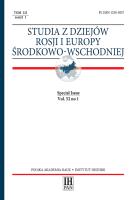„Anticolonial Intellectual” Anton Łuckiewicz and “Hybrid Nationalist” Otto Eichelman. A Comparative Study of Federalist Utopias
„Anticolonial Intellectual” Anton Łuckiewicz and “Hybrid Nationalist” Otto Eichelman. A Comparative Study of Federalist Utopias
Author(s): Gennadii KorolovSubject(s): Political history, Recent History (1900 till today), Pre-WW I & WW I (1900 -1919)
Published by: Instytut Historii im. Tadeusza Manteuffla Polskiej Akademii Nauk
Keywords: Anton Łuckiewicz;Otto Eichelman;Belarusian federalist ideas;postcolonial intellectual;hybrid nationalist;Eastern Europe history;
Summary/Abstract: It is not an easy task to compare Łuckiewicz federalist ideas with a project by Otto Eichelman. As a Belarusian activist, he perceived federalism as a political system within a great state project – a Grand Duchy of Lithuania. Eichelman on the other hand sought to substantiate with historical facts a project of domestic federalisation of Ukraine. In their concepts it was to be a national state which, due to difficult international conditions could be realised as a federation, even a multiethnic one. Łuckiewicz could be described as a “anti-colonial intellectual” who placed any Belarusian statehood within a broad federal union. For him, the Belarusian independence depended on the freedom of neighbouring countries. In Łuckiewicz view the transformation of the whole Eastern Europe was possible after the elimination of Russian imperialism in favour of federalisation of the region. This opinion was shared by Eichelman. But they disagreed in one point: the Belarusian activist excluded Russian from Eastern-European statehood, while the Ukrainian lawyer included Russia in his concept of the union of independent states. It could be said that after 1918 they rhetorically adopted the formula of federalisation on the principle of “imperialising nations”, without thinking of its implementation. Both of them favoured federalisation, on the condition, however, that Lithuania or the Crimea would be included in their state. A common feature of Łuckiewicz’s and Eichelman’s federalist utopias were their ideological sources: the German thought of “nationalist federation”, socialist ideas and nationalism. They responded to geopolitical interests of Eastern Europe and the struggle against Bolshevism. Łuckiewicz’s and Eichelman’s concepts expressed hopes for the creation of the foundations of the statehood of these countries.
Journal: Studia z Dziejów Rosji i Europy Środkowo-Wschodniej
- Issue Year: 52/2017
- Issue No: 1
- Page Range: 55-71
- Page Count: 17
- Language: English

